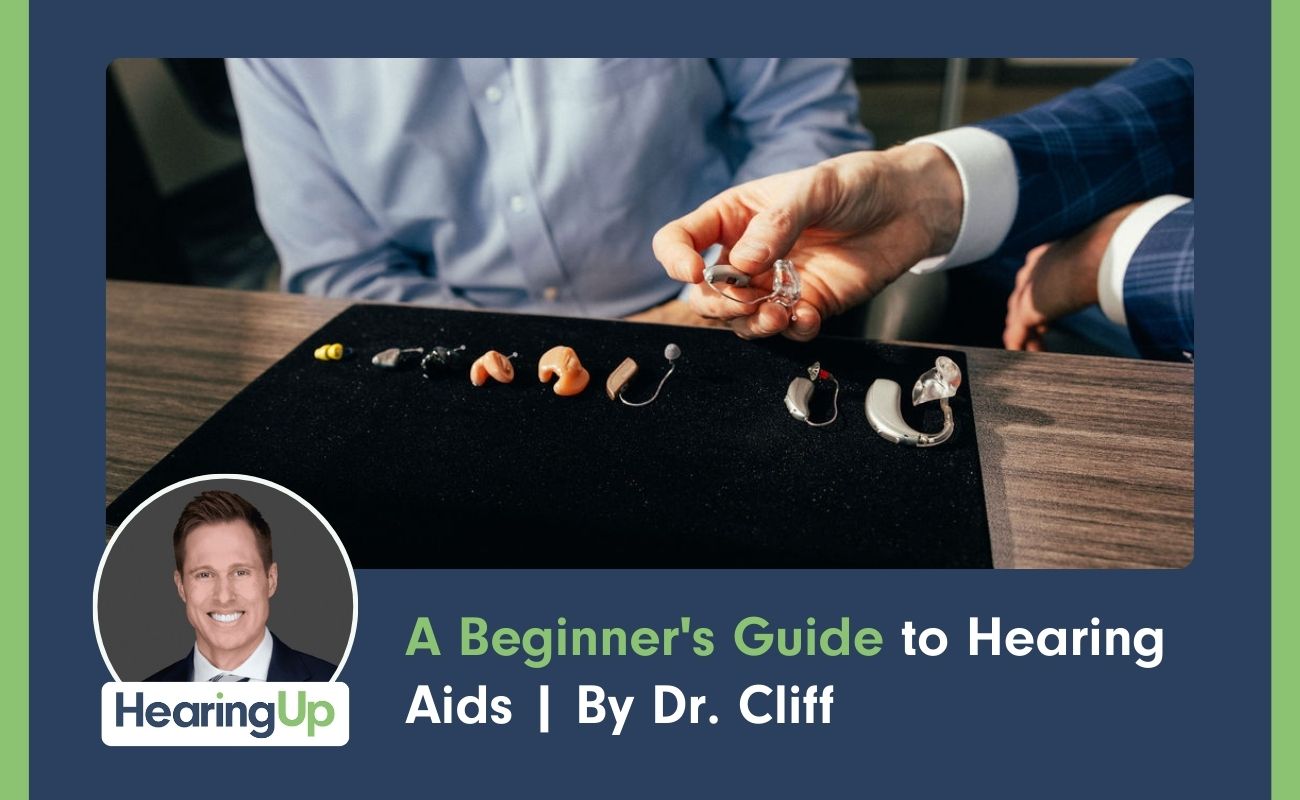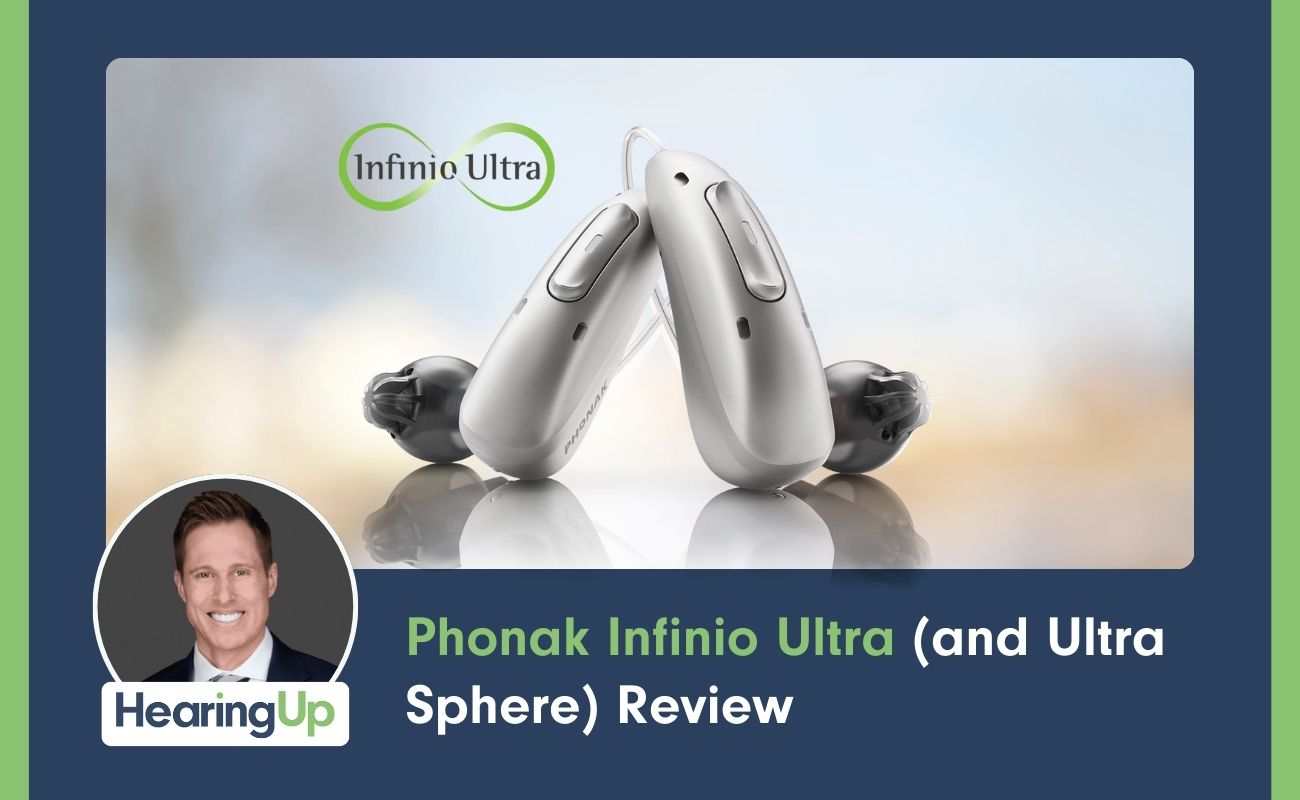Over-the-counter hearing aids are about to make prescription hearing aids a lot more expensive. Hi guys. Cliff Olson, Doctor of Audiology and founder of Applied Hearing Solutions in Phoenix, Arizona. And in this video, I'm explaining exactly why over-the-counter hearing aids will not make the price of prescription hearing aids come down and why hearing aid prices will continue to climb, coming up.
With the average pair of hearing aids costing more than $4,000, it is no wonder why a number of Americans refuse to treat their hearing loss at this price point. While data suggests that price is not the only barrier to hearing aid adoption, it is one of the main reasons why the Over-the-Counter Hearing Aid Act was signed into law. Some of the more optimistic hearing aid users out there also believe that over-the-counter hearing aids will bring down the price of prescription hearing aids due to increased competition. Well, I hate to be the contrarian here, but I happen to believe that over-the-counter hearing aids are not going to have a downward pressure effect on the price of prescription hearing aids. And I have six reasons why that I'll share in this video. But make sure that you stay tuned to the end of this video because I'm actually going to share how I think over the counter hearing aids could drive up the price of prescription hearing aids.
But before I explain what these reasons are, if you could do me a huge favor and click the like button, it really helps out my channel because it gets these videos in front of a bigger audience. And while you're at it, if you have not yet hit that subscribe button with notification bell, go ahead and do that as well, because that ensures that you never miss one of my newly released videos and I release multiple new videos every single week. That being said, I really appreciate it. Now let's get into my one disclaimer for this video. Just in case you are questioning my level of bias, just keep in mind here that I do dispense prescription hearing aids out of my clinic, and I do sell over-the-counter hearing aids through my website HearingUp.com. So if I am biased, I am biased in both directions.
That being said, let's go ahead and get into the first reason why I do not believe that over-the-counter hearing aids will drive down the price of prescription hearing aids, which is direct to consumer hearing aids have been around for decades and prescription hearing aids have actually gone up in price. While OTC hearing aids only became an official category as of October, 2022, DTC hearing aids have been around for a while. This means that we already have a pretty good idea how over-the-counter hearing aid technology is going to affect the prescription category. And the answer is not that much. In fact, most of the over-the-counter hearing aids available right now are the exact same devices that were available to individuals with hearing loss before October, 2022. Just look at the devices sold by Bose, Eargo and Nuheara prior to the official OTC category. All of their current OTC hearing aid offerings, either under their current brand or a different brand, are all identical or nearly identical to all of the devices that they previously sold.
And you know what? Those did not reduce the price of prescription hearing aids in that time, and they have continued to show that they have no impact on prescription hearing aid prices since they've become official OTC products. The second reason why OTC hearing aids will not reduce the cost of prescription hearing aids is that they are only intended for adults with perceived mild to moderate hearing loss. When you look at current hearing aid adoption rates, the vast majority of individuals who choose to treat their hearing loss have a moderately severe to profound level of hearing loss. Only around 10% of individuals with a mild to moderate hearing loss actually choose to treat it. And even if over-the-counter hearing aids saw a dramatic increase in the adoption rates of this category of individuals, it would not cannibalize or affect the prescription hearing aid market very much at all, meaning that prescription hearing aid manufacturers would have no reason to reduce the cost of their prescription hearing aids.
And the individuals who sold these hearing aids would have no reason to reduce the cost of their services to compete with over-the-counter hearing aid offerings because the current demand for prescription hearing aids would not drop. This also leads me to reason number three, why OTC hearing aids will not reduce the price of prescription hearing aids, which is prescription hearing aids still require professional services. One of the main reasons why prescription hearing aids cost what they do is that it includes the price of the devices as well as the professional services, including the fitting, programming, and long-term aftercare with your devices. Most hearing aid clinics still use a bundled model of hearing aid delivery, which means they bundle in the price of everything into the cost of the hearing aid, which makes the cost of the hearing aid look really high, when in fact only one third to one half of the total cost is due to the technology, and the remaining cost is due to the services that you get from your provider.
In fact, you could even purchase over-the-counter hearing aids, take them in to a hearing care professional who follows best practices so you can get the most out of those devices and you'll actually pay them separately for those services. In some clinics, you may be spending the exact same amount of money if you went in to get professional care with your over-the-counter hearing aids as you would purchasing prescription hearing aids and getting the same level of service. Now, if you wanna learn more about the best practices that I'm specifically talking about, make sure that you check out my best practices video that I will also link in the description. The fourth reason why over-the-counter hearing aids will not reduce the price of prescription hearing aids is that there are already some clinics out there that will sell you prescription hearing aids with professional care at a price
that is at or below what current over-the-counter hearing aids cost. One of my colleagues and HearingUp provider, Dr. Scot Frink from Salem Audiology Clinic in Salem, Oregon, actually will sell prescription hearing aids with a fitting appointment as well as two follow up appointments for right around a thousand dollars for a pair. Based on my testing of over-the-counter hearing aids, prescription hearing aids even at a lower tier are better than over-the-counter hearing aids. They have many more features and customizations. This means that for all the individuals out there who've been waiting for over-the-counter hearing aids because of a lower price, you've been always able to get that price at a lot of different hearing clinics and also get professional care along with it. And this also includes if you have a severe hearing loss. So if you're looking for a low-cost option, reach out to your local audiology clinic, let them know what your budget is and see what they have to offer you.
But the point is, if there is already a competitive option inside of an audiology clinic for a prescription hearing aid that includes a professional fitting, then over-the-counter hearing aids are not gonna put any more downward price pressure on it. The fifth reason why over-the-counter hearing aids will not reduce the price of prescription hearing aids is we're not even comparing apples to apples. Let me give you an analogy, and as much as I hate to use a car analogy when it comes to hearing aids, I'm gonna do it anyway because a lot of people are gonna understand what I'm talking about. Ferrari is not going to lower the cost of their cars if Ford comes out with a new Ford Pinto. As much as some people would like to deny it, premium prescriptive level hearing aids are substantially better than some of the best over-the-counter hearing aids out there that I've tested so far. The amount of features and customizations is not even in the same ballpark.
Many of the premium prescription hearing aids currently available on the market that would cost you anywhere between $4,000 and $7,000 for a pair are much more equivalent to the Ferrari of the world. And the over-the-counter hearing aids that range anywhere from 250 to $3,000 for a pair are more like the Ford Pintos. Now here's the thing, there is nothing wrong with the Ford Pinto. It will get you from point A to point B just like a Ferrari would. They're just going to give you completely different experiences on the way. Just like Ferrari, prescription hearing aid manufacturers are not going to reduce the price of their premium offerings just because there's a new over-the-counter hearing aid hitting the market. And the sixth and final reason why over-the-counter hearing aids will not reduce the price of prescription hearing aids is that the vast majority of individuals who try over-the-counter hearing aids will graduate into prescriptive level hearing aids within a year.
One of the big things that I've learned over the past six years of doing this YouTube channel and running my clinic here in Phoenix is that the vast majority of individuals who try direct to consumer hearing aids end up graduating to prescriptive level hearing aids within one year of purchase. A large reason for this is that a lot of people who purchase these direct-to-consumer slash over-the-counter hearing aids end up not being a good candidate for them because their hearing loss is too significant or they're individuals who just want better features available to them through prescriptive hearing aids. I actually see over the counter hearing aids as a stepping stone to prescriptive level care. Now, I love that it exists because we need to have some more stepping stones for people to get their feet wet with amplification before they graduate to prescriptive level care. But what this does is it actually increases the demand for prescription hearing aids, preventing prices from falling.
In fact, this is exactly why I believe over-the-counter hearing aids will result in a price increase for prescription hearing aids over time. If over-the-counter hearing aids lead to an increase in hearing aid adoption rates, then we are likely going to see an increased demand for prescription hearing aids as well. And based on basic economic theory, when you have an increase in demand, prices are gonna go up too. On top of that, there is already a massive shortage in audiologists as well as hearing instrument specialists. So when there's a higher demand for the time of these individuals, the cost of that time is gonna go up too, which means that not only will you have prescription hearing aid prices going up, you're also gonna have services associated with them going up as well. And this is without even considering that inflation has increased the prices of prescription hearing aids over the past two years based on all of these factors, I don't see any way that prescription hearing aids will actually come down in price just because there's a new over-the-counter hearing aid category and I fail to see how anyone could argue otherwise.
Of course, if you think differently and you can support your hypothesis, I would love to hear it down in the comment section below. Ultimately, time will tell if over-the-counter hearing aids has any effect on pricing of prescription level hearing aids in the short term or long term. Until then, I will continue to be a cheerleader for over-the-counter hearing aids and prescription hearing aids and wait to see how it all plays out. That's it for this video. If you have any questions, leave them in the comment section below. If you like the video, please share it. And if you wanna see other videos just like this one, go ahead and hit that subscribe button. Also, feel free to check out my website, HearingUp.com.
Over-the-counter hearing aids are about to make prescription hearing aids a lot more expensive. Hi guys. Cliff Olson, Doctor of Audiology and founder of Applied Hearing Solutions in Phoenix, Arizona. And in this video, I'm explaining exactly why over-the-counter hearing aids will not make the price of prescription hearing aids come down and why hearing aid prices will continue to climb, coming up.
With the average pair of hearing aids costing more than $4,000, it is no wonder why a number of Americans refuse to treat their hearing loss at this price point. While data suggests that price is not the only barrier to hearing aid adoption, it is one of the main reasons why the Over-the-Counter Hearing Aid Act was signed into law. Some of the more optimistic hearing aid users out there also believe that over-the-counter hearing aids will bring down the price of prescription hearing aids due to increased competition. Well, I hate to be the contrarian here, but I happen to believe that over-the-counter hearing aids are not going to have a downward pressure effect on the price of prescription hearing aids. And I have six reasons why that I'll share in this video. But make sure that you stay tuned to the end of this video because I'm actually going to share how I think over the counter hearing aids could drive up the price of prescription hearing aids.
But before I explain what these reasons are, if you could do me a huge favor and click the like button, it really helps out my channel because it gets these videos in front of a bigger audience. And while you're at it, if you have not yet hit that subscribe button with notification bell, go ahead and do that as well, because that ensures that you never miss one of my newly released videos and I release multiple new videos every single week. That being said, I really appreciate it. Now let's get into my one disclaimer for this video. Just in case you are questioning my level of bias, just keep in mind here that I do dispense prescription hearing aids out of my clinic, and I do sell over-the-counter hearing aids through my website HearingUp.com. So if I am biased, I am biased in both directions.
That being said, let's go ahead and get into the first reason why I do not believe that over-the-counter hearing aids will drive down the price of prescription hearing aids, which is direct to consumer hearing aids have been around for decades and prescription hearing aids have actually gone up in price. While OTC hearing aids only became an official category as of October, 2022, DTC hearing aids have been around for a while. This means that we already have a pretty good idea how over-the-counter hearing aid technology is going to affect the prescription category. And the answer is not that much. In fact, most of the over-the-counter hearing aids available right now are the exact same devices that were available to individuals with hearing loss before October, 2022. Just look at the devices sold by Bose, Eargo and Nuheara prior to the official OTC category. All of their current OTC hearing aid offerings, either under their current brand or a different brand, are all identical or nearly identical to all of the devices that they previously sold.
And you know what? Those did not reduce the price of prescription hearing aids in that time, and they have continued to show that they have no impact on prescription hearing aid prices since they've become official OTC products. The second reason why OTC hearing aids will not reduce the cost of prescription hearing aids is that they are only intended for adults with perceived mild to moderate hearing loss. When you look at current hearing aid adoption rates, the vast majority of individuals who choose to treat their hearing loss have a moderately severe to profound level of hearing loss. Only around 10% of individuals with a mild to moderate hearing loss actually choose to treat it. And even if over-the-counter hearing aids saw a dramatic increase in the adoption rates of this category of individuals, it would not cannibalize or affect the prescription hearing aid market very much at all, meaning that prescription hearing aid manufacturers would have no reason to reduce the cost of their prescription hearing aids.
And the individuals who sold these hearing aids would have no reason to reduce the cost of their services to compete with over-the-counter hearing aid offerings because the current demand for prescription hearing aids would not drop. This also leads me to reason number three, why OTC hearing aids will not reduce the price of prescription hearing aids, which is prescription hearing aids still require professional services. One of the main reasons why prescription hearing aids cost what they do is that it includes the price of the devices as well as the professional services, including the fitting, programming, and long-term aftercare with your devices. Most hearing aid clinics still use a bundled model of hearing aid delivery, which means they bundle in the price of everything into the cost of the hearing aid, which makes the cost of the hearing aid look really high, when in fact only one third to one half of the total cost is due to the technology, and the remaining cost is due to the services that you get from your provider.
In fact, you could even purchase over-the-counter hearing aids, take them in to a hearing care professional who follows best practices so you can get the most out of those devices and you'll actually pay them separately for those services. In some clinics, you may be spending the exact same amount of money if you went in to get professional care with your over-the-counter hearing aids as you would purchasing prescription hearing aids and getting the same level of service. Now, if you wanna learn more about the best practices that I'm specifically talking about, make sure that you check out my best practices video that I will also link in the description. The fourth reason why over-the-counter hearing aids will not reduce the price of prescription hearing aids is that there are already some clinics out there that will sell you prescription hearing aids with professional care at a price
that is at or below what current over-the-counter hearing aids cost. One of my colleagues and HearingUp provider, Dr. Scot Frink from Salem Audiology Clinic in Salem, Oregon, actually will sell prescription hearing aids with a fitting appointment as well as two follow up appointments for right around a thousand dollars for a pair. Based on my testing of over-the-counter hearing aids, prescription hearing aids even at a lower tier are better than over-the-counter hearing aids. They have many more features and customizations. This means that for all the individuals out there who've been waiting for over-the-counter hearing aids because of a lower price, you've been always able to get that price at a lot of different hearing clinics and also get professional care along with it. And this also includes if you have a severe hearing loss. So if you're looking for a low-cost option, reach out to your local audiology clinic, let them know what your budget is and see what they have to offer you.
But the point is, if there is already a competitive option inside of an audiology clinic for a prescription hearing aid that includes a professional fitting, then over-the-counter hearing aids are not gonna put any more downward price pressure on it. The fifth reason why over-the-counter hearing aids will not reduce the price of prescription hearing aids is we're not even comparing apples to apples. Let me give you an analogy, and as much as I hate to use a car analogy when it comes to hearing aids, I'm gonna do it anyway because a lot of people are gonna understand what I'm talking about. Ferrari is not going to lower the cost of their cars if Ford comes out with a new Ford Pinto. As much as some people would like to deny it, premium prescriptive level hearing aids are substantially better than some of the best over-the-counter hearing aids out there that I've tested so far. The amount of features and customizations is not even in the same ballpark.
Many of the premium prescription hearing aids currently available on the market that would cost you anywhere between $4,000 and $7,000 for a pair are much more equivalent to the Ferrari of the world. And the over-the-counter hearing aids that range anywhere from 250 to $3,000 for a pair are more like the Ford Pintos. Now here's the thing, there is nothing wrong with the Ford Pinto. It will get you from point A to point B just like a Ferrari would. They're just going to give you completely different experiences on the way. Just like Ferrari, prescription hearing aid manufacturers are not going to reduce the price of their premium offerings just because there's a new over-the-counter hearing aid hitting the market. And the sixth and final reason why over-the-counter hearing aids will not reduce the price of prescription hearing aids is that the vast majority of individuals who try over-the-counter hearing aids will graduate into prescriptive level hearing aids within a year.
One of the big things that I've learned over the past six years of doing this YouTube channel and running my clinic here in Phoenix is that the vast majority of individuals who try direct to consumer hearing aids end up graduating to prescriptive level hearing aids within one year of purchase. A large reason for this is that a lot of people who purchase these direct-to-consumer slash over-the-counter hearing aids end up not being a good candidate for them because their hearing loss is too significant or they're individuals who just want better features available to them through prescriptive hearing aids. I actually see over the counter hearing aids as a stepping stone to prescriptive level care. Now, I love that it exists because we need to have some more stepping stones for people to get their feet wet with amplification before they graduate to prescriptive level care. But what this does is it actually increases the demand for prescription hearing aids, preventing prices from falling.
In fact, this is exactly why I believe over-the-counter hearing aids will result in a price increase for prescription hearing aids over time. If over-the-counter hearing aids lead to an increase in hearing aid adoption rates, then we are likely going to see an increased demand for prescription hearing aids as well. And based on basic economic theory, when you have an increase in demand, prices are gonna go up too. On top of that, there is already a massive shortage in audiologists as well as hearing instrument specialists. So when there's a higher demand for the time of these individuals, the cost of that time is gonna go up too, which means that not only will you have prescription hearing aid prices going up, you're also gonna have services associated with them going up as well. And this is without even considering that inflation has increased the prices of prescription hearing aids over the past two years based on all of these factors, I don't see any way that prescription hearing aids will actually come down in price just because there's a new over-the-counter hearing aid category and I fail to see how anyone could argue otherwise.
Of course, if you think differently and you can support your hypothesis, I would love to hear it down in the comment section below. Ultimately, time will tell if over-the-counter hearing aids has any effect on pricing of prescription level hearing aids in the short term or long term. Until then, I will continue to be a cheerleader for over-the-counter hearing aids and prescription hearing aids and wait to see how it all plays out. That's it for this video. If you have any questions, leave them in the comment section below. If you like the video, please share it. And if you wanna see other videos just like this one, go ahead and hit that subscribe button. Also, feel free to check out my website, HearingUp.com.

Hearing aid success requires 90-min evaluations, Real Ear Measurement programming, appropriate tech selection, 30-day adaptation and ongoing professional follow-up.
Read More
Phonak Infinio Ultra firmware adds AutoSense OS 7.0 (24% better), 30% improved battery (10hrs with AI), simplified Bluetooth pairing, and faster feedback tests.
Read More
Starkey Omega AI improves on Edge AI with DNN 360 (19.6% better speech clarity), spatial awareness, find-my-hearing-aid lights, and 20x stronger custom shells.
Read More
AirPods Pro 3 with iOS 18.1+ offer clinical-grade hearing aid features for mild-moderate loss, including built-in testing, custom amplification, and audiogram uploads.
Read More
Top 2026 RIC hearing aids: Phonak Ultra Sphere Infinio (AI noise reduction), Starkey Omega AI, Oticon Intent, Signia IX, Widex SmartRIC.
Read More
Best 2026 invisible aids: Oticon Zeal (AI/Auracast), Phonak Lyric (self-replace), Starkey IIC (minimal), Phonak Titanium (durable), Oticon Own (AI processing).
Read More